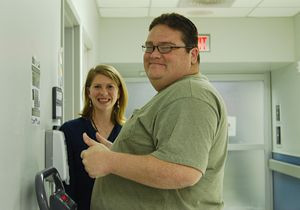Cash For Weight Loss? Workers Better Achieve Health Goals With Group-Based Incentives, Study Finds

America's health care system continues to highlight the yin and yang of the human animal: intensely cooperative, intensely competitive.
In fact, a new study finds that incentivizing workers to achieve cost-saving individual health goals works best in a competitive environment -- with other people.
Under the Affordable Care Act of 2010, U.S. employers providing health insurance would soon be permitted to offer workers even larger financial incentives to improve health behaviors, potentially leading to savings on health care premiums.
To that end, researchers found that people tend to better achieve personal health goals with rewards based on group performance, according to a report today in the Annals of Medicine from investigators led by the U.S. Department of Veterans Affairs' Ann Arbor Healthcare System.
In fact, group-based incentives proved nearly three times as effective.
"There is broad and growing enthusiasm for rewarding healthy behaviors in the workplace but there is little evidence on the effects of these strategies," said Dr. Jeffrey T. Kullgren, a health services researcher in the Veteran's Affairs' Center for Clinical Management Research and the division of general medicine in the University of Maryland's medical school. "We anticipate more employers to offer these awards in an effort to help control health care costs while also improving the health of employees."
In the study, government-funded researchers analyzed two types of incentive strategies among obese workers at the Children's Hospital in Philadelphia. In the first, people received $100 monthly for meeting or exceeding weight-loss goals, whereas the second group placed people in teams of five for a combined pot of $500.
Adding a bit of complexity, the researchers allowed some to earn more than their usual share were other members to fail in meeting goals.
"We found that these incentives were substantially more powerful when delivered in groups, which has important implications for both policymakers and the employers who are considering offering them," said Kullgren.
In six months' time, they had a winner: the group-based approach.
"Despite the health and economic consequences of obesity, the problem isn't getting any better and there is great interest in identifying new approaches to combating this major health issue in our country," said Kullgren, who also conducts research for the Institute for Healthcare Policy and Innovation. "Approaches such as [the TV show] 'The Biggest Loser' have received popular attention as ways to harness group dynamics to encourage weight loss but the winner-take-all nature could be discouraging for everyone but the most successful person."
Kullgren said researchers now need to gather more data to compare various kinds of group-based approaches.
Funding for this study was provided by the U.S. National Institutes of Health's National Institute of Aging, the U.S. Department of Veterans Affairs and the Robert Wood Johnson Foundation.



























